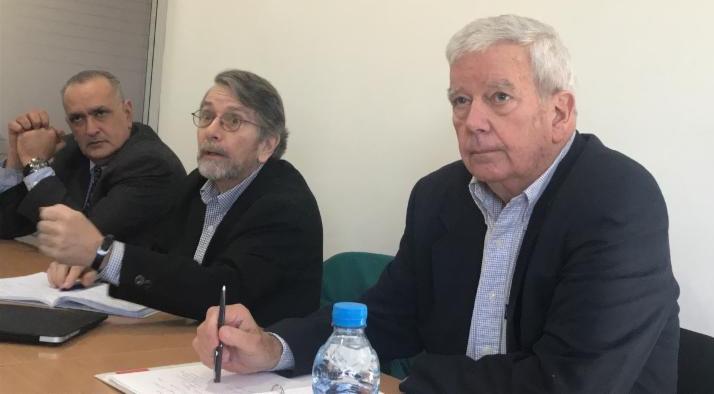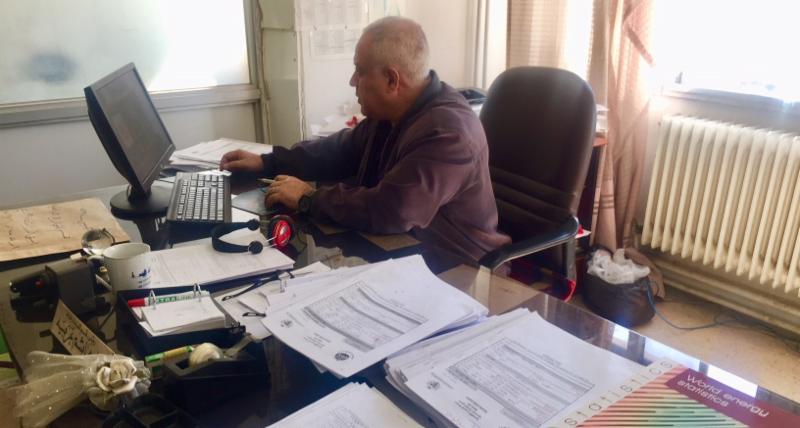Promoting Entrepreneurship and Small Business Growth in Morocco

FSVC volunteer experts John Glazer (middle) and John Dorland (right) meet with entrepreneurs and small business owners; Casablanca, Morocco, January 25, 2018.
FSVC has launched a program (called “Gazelles Al Maghrib”) to promote entrepreneurship and small businesses in Morocco. Gazelles are high-growth companies that increase their revenues by at least 20% annually over a period of 4 years or more. Gazelles are associated with above-average rates of job creation and wealth creation, as international research suggests that gazelles create 38% of all new jobs.
In December 2017, FSVC and its local partner LixCap identified approximately 30 start-ups and small and medium-sized enterprises (SMEs) that could potentially be included in the program, and receive targeted technical assistance to become a gazelle.
In January 2018, FSVC volunteer experts and local business incubators met with each of these 30 candidates in Casablanca, Morocco, to identify issues preventing them from generating greater revenue and obtaining capital investment or loans. The volunteer experts are now drafting a detailed diagnostic that highlights each enterprise’s specific needs. This diagnostic will serve as a roadmap for the remainder of the program, and will help provide practical, tailored business solutions to support promising local enterprises.
This program is funded by the Middle East Partnership Initiative (MEPI) at the U.S. Department of State.
Somalia: Strengthening AML/CFT Compliance for Money Transfer Businesses

FSVC Mentors Mohamed Adam (bottom row, far left) and Jackson Madzima (top row, second from left) with MTB staff in Garowe, Somalia, January 15, 2018.
FSVC trained over 40 staff from money transfer businesses (MTBs) in Garowe, Somalia, in best practices in anti-money laundering/combating the financing of terrorism (AML/CFT) compliance. Preventing money laundering and terrorist financing in the MTB sector is especially important in Somalia, as remittances account for over 60% of the Somali economy, and the majority of these remittances are transacted through MTBs.
FSVC Mentors Mohamed Adam and Jackson Madzima were accompanied by members of the Central Bank of Somalia’s Licensing and Supervision Department (LSD) team, who led the training sessions under the guidance of the FSVC Mentors. The first training was tailored to MTB managers and compliance officers, and the second training to MTB tellers. Topics included identifying suspicious activity, filing suspicious transaction reports, conducting due diligence on customers and monitoring transactions.
Complying with the national laws and international AML/CFT standards will not only help to promote the safety and stability of Somalia’s financial sector, but will also allay concerns of international regulatory bodies and help enable the critical flow of remittances to people living in Somalia.
FSVC’s work in Somalia is made possible by a grant from the Bureau of Counterterrorism at the U.S. Department of State.
Sustainable Results: Reducing Administrative Barriers for Small Businesses in Jordan

FSVC volunteer expert Nimer Gharbia led a committee to adopt UN guidelines to facilitate small business registration; Amman, Jordan, August 2017.
From 2013-2015, FSVC implemented a highly-effective program to improve business registration and licensing in Jordan. By working with the public and private sectors, FSVC was able to help reduce administrative barriers preventing small businesses from registering. This program helped lead to the registration of nearly 13,000 new businesses in Jordan.
Among other reforms, FSVC helped introduce a more efficient business classification system. When a business registers in Jordan, the government assigns it the appropriate classification for the aggregation of national statistics. FSVC introduced United Nations guidelines that standardize classifications across all countries, and provided guidance to the Jordanian government on the adoption of these measures to streamline bureaucratic processes.
Following the completion of FSVC’s program, one of the FSVC volunteer experts who participated in the program, Mr. Nimer Gharbia, Head of Industrial and Energy Statistics at the Jordan Department of Statistics, continued to push for reforms. Mr. Gharbia helped form a committee of relevant government agencies that successfully adopted new classification guidelines in August 2017. By adopting these guidelines, the committee reduced the number of industrial classifications from 23,000 to 419. This reform has greatly expedited the business registration process, and has improved the ability of the government to collect and measure business statistics in Jordan, ultimately creating a better business environment in Jordan.